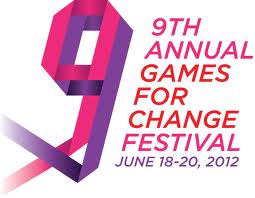At Games for Change (G4C) last week, the audience was treated to a number of interesting discussions and keynotes surrounding current issues of video game play for learning and social change. Among the hot topics were of course the impending “Gamepocalypse” that will arguably come as a result of intense “Gamification,” but there was also measured discussion around how people are working to find out where “gamifying” is most helpful to learning and education, and plenty of evidence of exciting collaborations among those working to incite change with games.
The Gamepocalypse is an idea from G4C keynote speaker Jesse Schell positing that advances in technology will soon make all of life a game. He often suggests that this has already happened or is currently happening because of all of the uses and roles that games take in daily life. After attending an event like G4C where people from all of the world come together to share their experiences with gaming across contexts of schooling, community service, international aid, health care, city planning, and social media interactions and participants are as influential as the World Bank, Justice Sandra Day O’Connor, and this year’s keynote speaker Vice President Al Gore, it may be difficult to argue with him. Games for Change celebrated its eighth festival this year, with an entire day devoted solely to games for learning.
Amidst this excitement around the potential and effectiveness of games however, the festival provided several voices calling for caution and sustainability when dealing with the adoption of games for change in learning environments. In a discussion around education and gaming, Jim Shelton, the US Department of Education Secretary of Innovation and Improvement, reminded the audience that we still have “a lot to learn about where ‘gamifying’ is most helpful.” Although Shelton pressed that we as a nation need to reinvent what we’ve been doing in education in America, he also held that a movement around games for learning calls for evidence-based policy and some very compelling success stories.
Luckily some of those nascent success stories were in attendance at the festival, as a number of small developers got the opportunity to share their games and contribute to the discussion of how to navigate the treacherous landscape of educational games. One such speaker was Dan White of Filament Games, to whom the Cooney Center awarded the National STEM Video Games prize this Spring for their health learning game “You Make Me Sick!” White described some of the barriers to educational game production, including the challenges of creating effective and fun designs, positive learning outcomes, meeting the demands of educators and publishers, working around tight budgets, struggling through a decentralized, noisy market, and helping parents assess quality. But, despite those barriers, he maintained that educational games are the new frontier and a valuable digital opportunity that educational content publishers and game developers are finally beginning to collaborate on.
Another group of developers got the chance to present their work to a panel of experts for feedback and constructive criticism. On the panel were Frank Lantz (NYU Game Center and Area/Code, now Zynga New York), Ken Perlin (G4Li – the Games for Learning Institute) and Connie Yowell (MacArthur Foundation) with Eric Zimmerman (NYU Game Center) serving as moderator. Games presented ranged from transmedia platforms to increase awareness of human trafficking, to a computer game to teach children about renewable energies through a robot named Ludwig, to gesture-based gaming to learn about nature. Developers across various stages of game production and release gained valuable perspectives on design, finding funding, determining appropriate audiences and distribution strategies. The conversations extended beyond the festival stage, and now that this year’s event is over, Games for Change is working to make many more resources available to people working is this field. I encourage those of you interested to stop by their site and find out more: http://www.gamesforchange.org/learn/.
*Photo from: http://www.playludwig.com/




